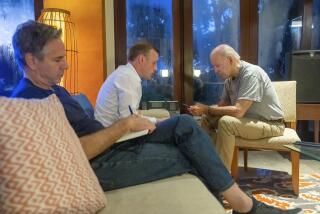THE SUMMIT IN TOKYO : Reporter’s Notebook : With Shultz on Hand, It All Adds Up
- Share via
TOKYO — Secretary of State George P. Shultz, once an economics professor, is sometimes still called upon in a crunch for a few numbers.
On Sunday, Shultz reverted to his old calling when the President was asked whether Saturday’s explosion of a Delta rocket carrying a weather satellite into space signaled shortcomings in the space program that might threaten U.S. security.
“No,” the President said, noting that Saturday’s explosion was only the 12th time the Delta has failed in 178 launchings.
“And so what’s 12 from 178?” Reagan asked, glancing at Shultz beside him, as if for help. Shultz then prompted the President, who added, “That’s 166--166 were successful.”
Despite the seriousness of the Soviet nuclear accident at Chernobyl, the President and the press managed to make a joke out of one of its more remote repercussions.
White House spokesman Larry Speakes said early Sunday that the President was not disturbed by reports from Japan’s Science and Technology Agency of elevated radiation levels in Tokyo’s rainfall.
Were any special precautions being taken to protect the President, a reporter asked. “He’ll use an umbrella,” Speakes deadpanned.
Later, as the President began a meeting with British Prime Minister Margaret Thatcher, another reporter asked, “If you’re not alarmed about the radiation, why is your hair glowing?” The President didn’t miss a beat. “I washed it, and I can’t do a thing with it,” he replied.
Two iron ladies clashed as Prime Minister Thatcher was confronted by United Press International’s veteran reporter, Helen Thomas, in the midst of what was supposed to be a genial photo opportunity with the seven leaders attending the summit here.
Thomas raised Thatcher’s ire when she asked Canadian Prime Minister Brian Mulroney what he thought of the rockets that exploded outside his embassy here.
“They are far more on your mind than ours, dear,” Thatcher interjected tartly. “We are not worried about it. Just don’t exaggerate them, all right? Got the message?”
Thomas stood her ground, saying, “I got your message.” Then she and other reporters put the question to Mulroney again.
“Well, I just listened to Mrs. Thatcher, and I agree,” the Canadian prime minister said.
“None of you are worried about terrorism?” Thomas asked.
“Terrorism is a matter which we shall be discussing, and we have occasion to be worried about it,” Thatcher replied. “And that’s why we’ve taken action about it.” Then she looked around for President Reagan, and added, “I hope the President will come soon, if this is going to go on.”
“What kind of action are you taking?” Thomas quickly asked.
“I think we’d better wait (on that), because otherwise you’ll have nothing to write about tomorrow,” Thatcher said.
Mulroney gallantly interceded, saying he was confident Thomas would find plenty to write about.
“You’ve given her a lot?” Thatcher asked.
When Thomas responded, “You’re really feeling your oats,” Thatcher seemed to have difficulty understanding the expression.
“Feeling what?” she asked, as an aide hurriedly whispered to her the definition “peppy, bright-eyed and bushy-tailed” for the American idiom. Thatcher looked dubious.
The struggle continued between the press and the massive security forces covering the summit, with related guerrilla warfare erupting among reporters from different countries vying for limited space.
White House spokesman Speakes on Sunday urged American reporters to mind their manners and not to push and shove as they had at an arrival ceremony for Italian Prime Minister Bettino Craxi.
“You would have been embarrassed had you noted the contrast between the U.S. press corps’ behavior and the Italian press corps’ behavior,” Speakes said. “The excitable Italians were much subdued, and the U.S. press corps was totally berserk.”
More to Read
Sign up for Essential California
The most important California stories and recommendations in your inbox every morning.
You may occasionally receive promotional content from the Los Angeles Times.













